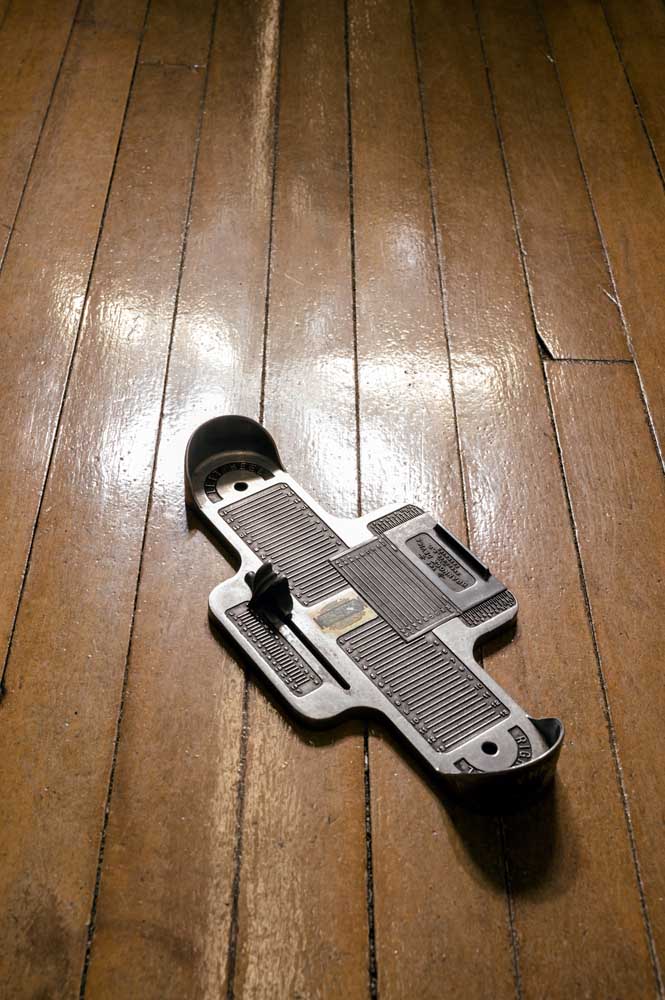Nike, other brands hurt independent shoe stores
Published 12:00 am Wednesday, June 19, 2019

- A shoe sizer at Colburn Shoe Store in Belfast, Maine, on April 26, 2019. The store was established in 1832 and has occupied the same small storefront on Belfast’s Main Street since 1905. (Tristan Spinski/The New York Times)
BELFAST, Maine —
Colburn Shoe Store, established in 1832, advertises itself as the oldest shoe store in the country.
Trending
It has occupied the same small storefront on Belfast’s Main Street since 1905. It’s a place where the owner, Colby Horne, and his father, Brian, remember the brand and size their customers like, and those of their children, their partners and probably their siblings, too.
They know the shoe business. But they can no longer sell some of the most popular brands, like Nike and Adidas.
The Hornes are among a number of independent retailers who have been cut off in recent years by giant shoe manufacturers adjusting their retail strategies. In some cases, small businesses are required to make large yearly purchases of $20,000 or more. That outlay can amount to at least 500 pairs of shoes, far too many for a one-room shop to carry and sell in a year in addition to its other brands.
Independent shoe stores like Colburn have been Main Street mainstays, but others have been pushed out of business by competition from big-box stores and online shopping. Now, with some big shoe companies’ required minimum orders, the smaller owners are under more pressure.
Glick’s Shoe Store in Lewistown, Pennsylvania, for example, closed on May 11, after 90 years in business. Nicole Swanger, the assistant manager, blames the store’s demise on losing its account with Nike, which had been its top-selling brand. And a Massachusetts retailer sued Nike after losing the account despite spending far more than $20,000 annually.
“The trend seems to be that volume is the way for the big shoe companies to make money,” Brian Horne said. “Obviously, a hole-in-the-wall shoe store doesn’t speak volume.”
Trending
In addition to the preference for larger retailers, Brian Horne said, the big shoe companies are increasingly steering customers to their own websites.
The U.S. footwear market was worth $72 billion for the 12 months that ended in March, and nearly 30% of those sales were made online, according to estimates from the NPD Group, a market research firm. Footwear sales were up 4% from the 12 previous months. But direct-to-consumer sales from brands’ own stores, websites and catalogs grew much faster, at 12%.
“It doesn’t mean the physical stores are going to go away, but there will be a whole lot less of them,” said Matt Powell, a sports industry analyst for NPD. “It’s unfortunate, because our country’s retail business was built on the small mom-and-pops.”
Nike ended its relationship with the Hornes with a November 2015 letter stating, “We have recently determined that Colburn Shoe Store no longer aligns with our business strategy.”
The shoemaker would not discuss the specifics of its retail approach.
“Nike continually evaluates the marketplace and competitive landscape to understand how we can best serve consumers,” Sandra Carreon-John, a Nike spokeswoman, said in an email statement. “As part of this, from time to time we do make adjustments to our sales channels, in order to optimize distribution.”
Adidas also declined to discuss specifics, but claimed it had no minimum order threshold. “Our retail partners can order products in any quantity,” the spokeswoman, Maria Culp, said in an email.
Yet Swanger, of Glick’s Shoe Store, said the increased minimum volumes were a significant reason for the store’s closing.
“It’s a huge problem. We lost Nike a couple years ago,” Swanger said. “That really hurt us.”
In late May, UGG closed its account with Maine Sport Outfitters, an independent outdoors store in Rockport, citing its failure to meet a $10,000 annual minimum. The company’s footwear buyer, Emma Beaudry, said the store had already lost its Adidas and Nike accounts, and minimum volumes were a factor in both cases.
Other independent retailers say they lost accounts despite maintaining minimums. Kevin Carter, a third-generation co-owner of Carter’s Clothing and Footwear, said the company’s stores in New Bedford and Fall River, Massachusetts, had bought $350,000 worth of Nike products annually, and that they represented nearly a quarter of its sales. But after a 30-year relationship, Nike stopped selling to Carter’s in 2013, with no explanation.
The Carter family sued Nike in 2013, claiming, in part, that the shoemaker’s letter terminating the account “was in bad faith, and intended to hide its true interest of favoring large-scale retailers who would set higher prices for Nike product.”
Nike moved to dismiss the suit, claiming its invoice agreement required dealers to file any legal action in Oregon, where the company is based. The court granted the motion to dismiss, but Carter said the family had chosen not to pursue a legal challenge in that state.
“The real sad part of it is, all the little independents that they are cutting off were around before the chains,” Carter said. “We were on every corner, and that’s what built their brand.”








